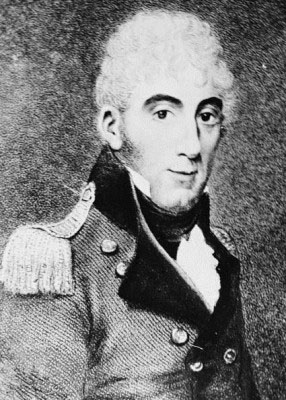When you next walk down the Collins Street reflect on the man after whom the street was named.
David Collins was born on 3 March 1754 in London and went to the Exeter Grammar School before joining the Royal Marines as an Ensign at the age of 14.
Collins went to North America early in 1775, and fought at the Battle of Bunker Hill, where the British suffered heavy casualties, but held the heights of Charlestown. He was promoted to first lieutenant the following week.
By November 1776 was stationed at Halifax, Nova Scotia, where he met and then married Mary (Maria Stuart) Proctor on 13 June 1777.
He was promoted captain-lieutenant in August 1779 and outright captain in July 1780. In February 1781 he joined the HMS Courageux in the Channel Squadron, but did not enjoy being at sea. After three years on half-pay stationed at Chatham, and with the prospect of a long peace, Collins was influenced by his father to accept appointment to the expedition to Botany Bay.
On 24 October 1786 he was commissioned deputy judge advocate of the new colony and likewise, by Admiralty warrant, of the marine detachment. He sailed without Maria in the Sirius with the First Fleet, arriving at Botany Bay on 20 January 1788. Next day he went with Governor Arthur Phillip’s party to examine Port Jackson. Six days later the fleet’s transfer to Sydney Cove was completed and the business of settlement began. On 7 February 1788 the government was formally inaugurated, Collins reading the relevant Act, commissions and letters patent.
Collins became the new colony’s first judge-advocate. He was responsible, under the governor, for the colony’s entire legal establishment. He issued all writs, summonses and processes, retained certain fees, and with one other justice of the peace formed the bench of magistrates.
In June 1788, Governor Phillip appointed Collins as the Secretary to the Governor. For the next eight years, quietly and efficiently, he was the indispensable aide to the officer administering the Government of New South Wales.
After a 10 year absence, Collins returned to England in June 1797 to nurse his wife who had become very ill. On 1 January 1798 he was promoted lieutenant-colonel, without pay or command, in recognition of his services in New South Wales.
In 1800, while the colonies were controlled by various departments in London, Collins wrote to the under-secretary of war, John Sullivan, offering to act as liaison officer for New South Wales. Nothing came of it, but his exceptional knowledge of the colony’s affairs was recognized and in 1802 he was chosen to form a new settlement in Bass Strait.
On 4 January 1803, Collins was commissioned lieutenant governor of the proposed new dependency under the governor of New South Wales. He sailed in April in H.M.S. Calcutta – again leaving Maria in England. When he arrived at Port Phillip Bay on 9 October, two days after the storeship Ocean, Collins was dismayed by the lack of timber and water, but he began unloading his convicts, settlers and stores at Sullivan Bay (near Sorrento), while Lieutenant Tuckey and George Prideaux Harris explored. Their reports were not encouraging, so he wrote to Governor Philip Gidley King suggesting removal of the settlement. King agreed, and Collins decided to move to the Derwent River area in Van Diemen’s Land (now Tasmania).
Collins was appointed as the first Lieutenant Governor of the Colony of Van Diemen’s Land and set about establishing the new colony. In April 1808 Collins was given brevet rank of colonel in the Army. Maria spoke of joining him, but she felt that could not leave her ailing mother in England.
Collins’ time as Lieutenant Governor was filled with challenges and conflict with his chain of command. This included an episode with William Bligh when Bligh blockaded the new colony in for several months until January 1810.
Collins died suddenly on 24 March 1810 aged 56. He was buried with full military honours on the spot intended for a church, and St David’s Cathedral in Hobart now bears his name. Maria died twenty years later at Plymouth on 13 April 1830.
Collins has also given his name to Collinsvale in Tasmania, Collins Street in Melbourne and Collins Street in Hobart, Tasmania.

Contact Marcus Fielding about this article.






